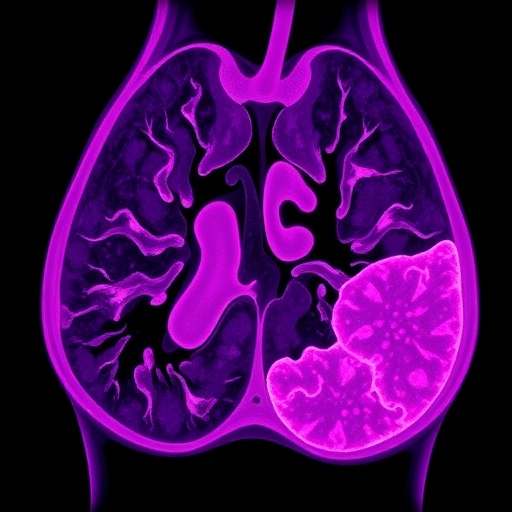In a groundbreaking study led by a team of researchers including Cheng, X., Zeng, W., and Yin, B., significant insights into the progression of breast ductal carcinoma have emerged. This research, published in the Journal of Translational Medicine, unravels the complexities of the spatiotemporal microenvironment surrounding cancerous tissues and how they influence epithelial pattern transitions. The implications of this work extend far beyond mere academic curiosity, presenting potential pathways for innovative therapeutic strategies in oncology.
Breast ductal carcinoma is one of the most prevalent forms of cancer, with millions affected worldwide. Understanding the dynamics of the tumor microenvironment is critical because it encompasses not just the tumor cells but also a variety of non-cellular components such as extracellular matrix, soluble factors, and immune cells. The interplay between these elements can determine how effectively the body combats the cancerous growth. This research sheds light on the intricate relationships within this microenvironment, highlighting how they evolve as the disease progresses.
The study employs advanced imaging and histological techniques to visualize the tumor microenvironment in breast ductal carcinoma. Cheng and colleagues utilized sophisticated imaging methods that allow for a detailed view of the spatial arrangement of cellular components within the tumor. This not only provides clarity about where different cell types reside but also about how their interactions may foster or inhibit tumor growth. This innovative approach overcomes many traditional limitations faced in cancer research, providing a more holistic view of tumor biology.
Additionally, the research identifies specific patterns of malignant epithelial transitions as cancer progresses. The team analyzed how tumor cells differentiate and invade surrounding tissues, which is crucial in understanding metastasis—the spread of cancer to other parts of the body. It becomes evident that the microenvironment is not a passive background but an active participant in cancer progression. The study brings to light the role of various signaling pathways and cellular interactions that facilitate these transitions.
These findings could pave the way for new therapeutic targets. By illustrating how the microenvironment influences malignant behavior, this research opens avenues for developing therapies that disrupt these interactions. For instance, if specific signaling pathways can be inhibited or modulated, it may be possible to slow or halt the progression of the cancer. This could lead to more effective treatments that not only target the cancer cells themselves but also modify the supporting environment to make it less conducive to tumor growth.
Moreover, the research emphasizes the need for personalized medicine in treating breast ductal carcinoma. The variability in tumor microenvironments between patients suggests that a one-size-fits-all approach to treatment may not be effective. By understanding individual tumor microenvironments, oncologists could tailor treatments that are specifically designed to target the unique features of a patient’s cancer.
The study also discusses the potential implications of these findings for predicting patient outcomes. Understanding the spatial and temporal aspects of tumor progression could help in developing prognostic tools that take the intricacies of the tumor microenvironment into account. This would enable better risk stratification for patients and inform treatment decisions based on the aggressiveness of their cancer.
Furthermore, the implications for clinical practice cannot be understated. Integrating insights from this research into routine diagnostics could enhance the way clinicians approach breast ductal carcinoma. It challenges the traditional views of cancer treatment and underscores the importance of seeing tumors as part of a larger ecosystem that includes the surrounding microenvironment.
In addition to providing crucial insights into breast ductal carcinoma, this study also highlights the interdisciplinary nature of modern cancer research. The collaboration between biologists, chemists, and clinicians exemplifies the need to integrate various scientific disciplines in order to tackle complex diseases. It encourages a holistic approach to cancer research and treatment that may yield greater benefits for patients.
As these findings circulate within the scientific community, they may influence future research directions. The study invites further exploration into other types of cancers where similar microenvironmental dynamics may be at play. Continued research could validate these findings across various cancer types, enriching our collective understanding of cancer biology and therapy.
Finally, the potential for this study to influence public health initiatives cannot be overlooked. By emphasizing the importance of early detection and personalized medicine, it could inspire programs aimed at increasing awareness of breast cancer and its biological complexities. As researchers continue to decode the mysteries of cancer, findings such as these serve as vital stepping stones in the quest for more effective treatments and, ultimately, a cure.
In conclusion, the research led by Cheng, X., Zeng, W., and Yin, B. on the spatiotemporal microenvironment landscape in breast ductal carcinoma progression is a significant contribution to the field of oncology. By bridging the gap between basic research and clinical application, it lays the groundwork for future breakthroughs in cancer treatment strategies, offering hope for improved patient outcomes in the battle against one of the leading causes of cancer-related deaths worldwide.
Subject of Research: Breast ductal carcinoma and its spatiotemporal microenvironment.
Article Title: Spatiotemporal microenvironment landscape and malignant epithelial pattern transition in breast ductal carcinoma progression.
Article References:
Cheng, X., Zeng, W., Yin, B. et al. Spatiotemporal microenvironment landscape and malignant epithelial pattern transition in breast ductal carcinoma progression. J Transl Med 23, 996 (2025). https://doi.org/10.1186/s12967-025-07010-3
Image Credits: AI Generated
DOI:
Keywords: Breast cancer, ductal carcinoma, tumor microenvironment, epithelial transitions, cancer progression, personalized medicine.




